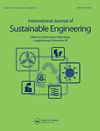The impact of recycling on the productivity of Municipal Solid Waste: a comparison of the Malmquist and Malmquist-Luenberger Productivity Indexes
IF 3.6
Q3 GREEN & SUSTAINABLE SCIENCE & TECHNOLOGY
International Journal of Sustainable Engineering
Pub Date : 2023-09-18
DOI:10.1080/19397038.2023.2256382
引用次数: 0
Abstract
Enhancing the economic and environmental efficiency of municipal solid waste (MSW) management is crucial for transitioning to a circular economy and achieving cost-efficient and sustainable waste practices. In this study, we introduce an innovative approach to examine the influence of MSW recycling on waste performance over multiple years. We employ a non-parametric method to assess and compare the Malmquist Productivity Index (MPI) and the Malmquist-Luenberger Productivity Index (MLPI) across 143 municipalities in Chile from 2015 to 2019. The findings reveal a positive trend in both MPI and MLPI. The average eco-productivity change (MLPI) is relatively lower than the average productivity change (MPI) throughout the evaluated years. The aggregated scores for MPI and MLPI between 2015 and 2019 stand at 2.73 and 1.33, respectively. The primary driver of productivity change is attributed to technical advancements, leading to a shift in the efficient frontier, while eco-productivity change predominantly arises from efficiency enhancements. This implies that municipalities have employed diverse strategies to enhance their economic and environmental performance. The results and implications of this study hold significance for policymakers at regional and local levels, offering valuable insights for optimising MSW management within the context of a circular economy.循环利用对城市生活垃圾生产率的影响:Malmquist和Malmquist- luenberger生产率指数的比较
提高城市固体废物管理的经济和环境效率对于向循环经济过渡和实现具有成本效益和可持续的废物处理方法至关重要。在这项研究中,我们引入了一种创新的方法来研究多年来城市固体废物回收对废物性能的影响。我们采用非参数方法评估和比较了2015年至2019年智利143个城市的Malmquist生产力指数(MPI)和Malmquist- luenberger生产力指数(MLPI)。研究结果显示MPI和MLPI均呈积极趋势。平均生态生产力变化(MLPI)相对低于平均生产力变化(MPI)。2015年至2019年,MPI和MLPI的综合得分分别为2.73和1.33。生产力变化的主要驱动力是技术进步,导致效率边界的转移,而生态生产力变化主要来自效率的提高。这意味着市政当局采用了各种战略来提高其经济和环境绩效。本研究的结果和意义对区域和地方层面的政策制定者具有重要意义,为在循环经济背景下优化城市生活垃圾管理提供了有价值的见解。
本文章由计算机程序翻译,如有差异,请以英文原文为准。
求助全文
约1分钟内获得全文
求助全文
来源期刊

International Journal of Sustainable Engineering
GREEN & SUSTAINABLE SCIENCE & TECHNOLOGY-
CiteScore
7.70
自引率
0.00%
发文量
19
 求助内容:
求助内容: 应助结果提醒方式:
应助结果提醒方式:


